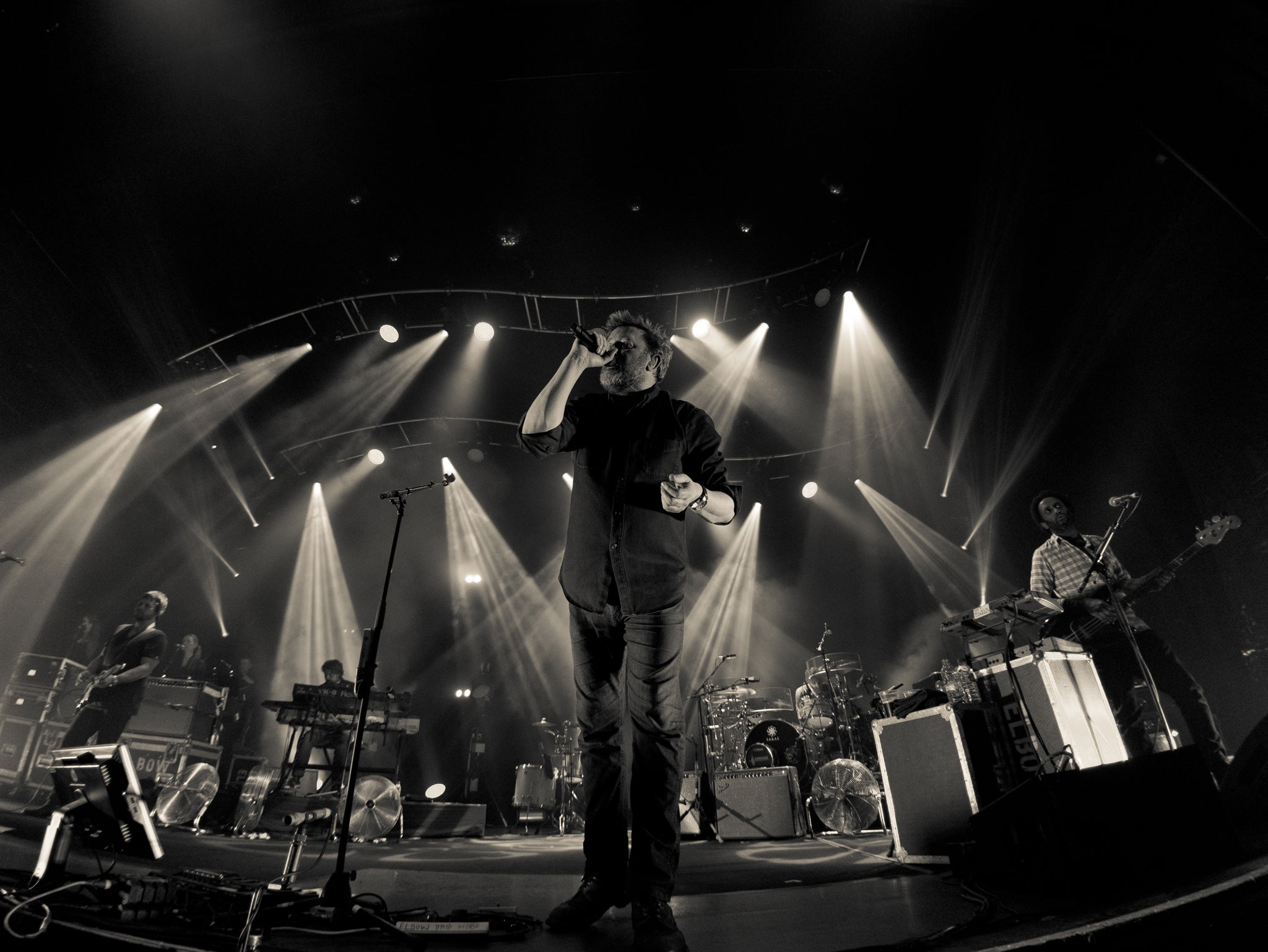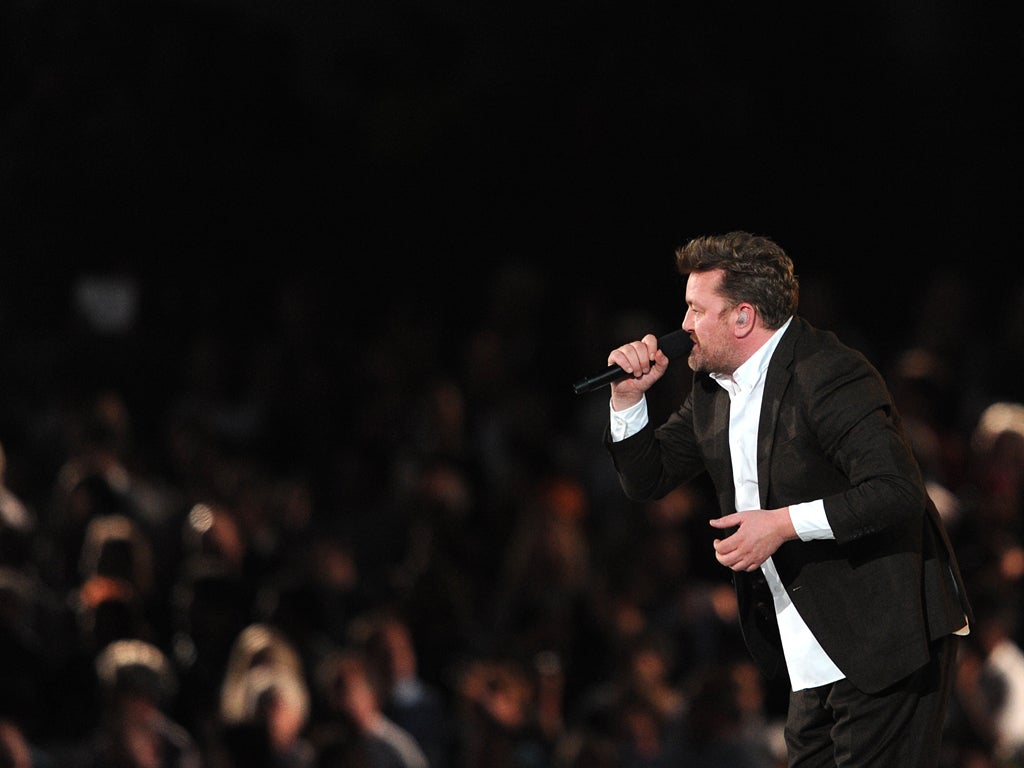Elbow's Guy Garvey and Pete Turner talk Lost Worker Bee, solo projects, egos and Ed Sheeran
Exclusive: The Manchester band on how heartbreak inspired their new EP
Your support helps us to tell the story
From reproductive rights to climate change to Big Tech, The Independent is on the ground when the story is developing. Whether it's investigating the financials of Elon Musk's pro-Trump PAC or producing our latest documentary, 'The A Word', which shines a light on the American women fighting for reproductive rights, we know how important it is to parse out the facts from the messaging.
At such a critical moment in US history, we need reporters on the ground. Your donation allows us to keep sending journalists to speak to both sides of the story.
The Independent is trusted by Americans across the entire political spectrum. And unlike many other quality news outlets, we choose not to lock Americans out of our reporting and analysis with paywalls. We believe quality journalism should be available to everyone, paid for by those who can afford it.
Your support makes all the difference.On a sun-soaked day in Manchester, Elbow’s Guy Garvey and Pete Turner are settled in a tiny yard at the back of The Eagle: a pub in dangerously tempting proximity to Salford’s Blueprint studios, where the band have recorded most of their material over a career spanning almost two and a half decades.
Frank Turner’s latest single is blaring from a pair of speakers, there’s a set-up for gigs downstairs, and an abundance of nooks and crannies including a room with an upright piano: perfect for a rowdy sing-song.
As you’d expect from a pair who have known each other since their time at Bury College, Garvey and Turner are a lot of fun to be around. During the course of our conversation pint glasses are emptied, filled again, and cigarettes are lit, puffed, stubbed out, as frontman and bassist poke fun at one another like a pair of 40-year-old school boys, cracking jokes and reminiscing over past exploits.
Frontman Garvey is explaining Elbow’s new EP, Lost Worker Bee, which was dropped almost without warning in late July. It’s a homage to Manchester, something to “tide fans over” but also “a piece of art for art’s sake” while the band work on their next album. They seem pretty chuffed with the result: Garvey shows me a new tattoo on his forearm of the Manchester worker-bee symbol, inspired by a mosaic at the city’s town hall.
This EP is the band’s way of pacing themselves, and maintains a willingness seen in previous work to expose raw emotion (“we’re all sensitive souls...”). Translated into lyrics, it becomes one of the reasons Elbow have such a mass appeal. Few other male frontmen will appear so vulnerable onstage, but, as Turner points out, Elbow’s audience could and has included three generations of the same family.
“You look at some band’s audiences, and it’s all young men,” Garvey says. “And I’m glad that didn’t happen to us. I like the fact our music appeals to a broader base of people.”
Elbow’s 25th anniversary is next year (the band count it from when they met, which Garvey reckons was end of term at college, 1991), and yet they are still brimming with potential. Each member has their own project, whether it’s teaching (drummer Richard Jupp), playing in a blues band (Turner), or working on a debut solo album, and all with the exception of Garvey, who is godfather to Turner’s son, have children.
Garvey says his solo record, due for release later this year, will be “exactly what you’d imagine”. Assembling a band of mates, he has “stretched them a bit” and moved them out of their comfort zones. Part of the exercise was for Garvey to see how quickly he could put the album together when he was the only decision-maker. The result is “quite punchy songs, with a few exceptions”.
“The odd thing will be come the autumn, when I’m doing a gig and look out to see Elbow in the audience,” he adds, grinning a little mournfully at Turner, who beams back. “It’s kind of like having the sword of Damocles hanging over me. It might be really well received, or it might be a disaster, and either way I think it’ll be fun.”
“Something we’ve always said we’d love to do is see Guy play on his own,” Turner says. He admits he asked his wife to put a family holiday on hold in case it clashed with Garvey’s solo tour, prompting an “awww” from his band-mate. “I can’t miss that opportunity. It might take off, and then that’s the only way I’ll get to see you,” he says, and the pair burst into another fit of the giggles.
Another new project is Garvey’s new BBC iPlayer series Music Box, “part of a crusade” shared by his fellow BBC Radio 6 Music presenters. After trying to get the show produced for five years, he was told he could run with it as long as he presented it himself. “It’s far from being a kind of nepotism,” he says. “I’m not being put in a trailer and dragged to make-up. And because we’re [he and producer Rachel Davies are] pals, I couldn’t get away with that behaviour even if I wanted to.”
He recalls a time they were working on a script together where he asked for something in the script to be changed because it “didn’t sound very cool”.
“She went: ‘Oh? Ok…’” he says, chuckling. “Then under her breath she went: ‘I taught you what cool was, dickhead.’”
Fearing that Britain is in danger of losing a generation of music over sweeping industry changes, Garvey feels the BBC is uniquely placed to showcase artists that, in his opinion, should be mainstream. Music Box is formatted in a similar way to his radio show, using heritage bands and archive footage to draw comparisons with new acts. “I just remember how difficult it was for us to get noticed,” he says. “I don’t know a promising new band today who’ve managed to quit their jobs. There needs to be a new industry model so people can afford to be in a band and make music, because the stuff coming through, or rather not coming through... that’s the issue.”

He heads to the bar for another round as Turner contemplates their last run of theatre shows, where he found himself going from months of school runs and bath time for his two children to standing in front of 40,000 fans. “I was thinking, ‘this is weird’,” he says. “To have that duality, to still have a normal life. We’re pretty lucky.”
Elbow are something of a phenomenon in their normality. Always consistent, the band have worked on their craft and maintained their reputation as “nice guys” without attracting any ire for that very reason.
“I was reading this interview with Ed Sheeran ahead of his gigs at Wembley,” Turner says. “And the journalist was saying he’s a nice guy, and that people are a bit annoyed about it. And I just thought, ‘you mean fuckers’.”
Garvey returns from the bar. “Ed gets slammed because he’s successful,” he says flatly, rolling a cigarette. “It’s the province of the British. To champion the underdog, and then when he succeeds, to try and bury him. And it’s not necessarily the British, it’s the media, it’s having an angle, having something to say.”
“A young lad having three nights at Wembley stadium, to 80,000 each night on his own, that’s impressive,” Turner says. “Let him enjoy it.”

It’s easy to see why they’d sympathise, as a band who worked relentlessly up to a strange kind of gradual success, to a point where they can boast (although they wouldn’t) a Mercury Prize, two Ivor Novellos, a Brit Award, sold-out shows at the 02 in London, a million UK copies sold of their single “One Day Like This”, another million for The Seldom Seen Kid, a theme for the 2012 Olympic Games coverage, plus a whole host of headline festival slots.
Remembering their first tour for Asleep in the Back, Turner says the band were asked afterwards if they were going to move to the capital: the automatic assumption for any act that has “made it”.
“I was like, ‘of course not’,” he says, perplexed at the thought of it. “It was that thing of: ‘You’re doing well’ – move to London.’ But this [Manchester] is our home… why would we leave?”
Their latest tour was mostly around theatre venues, where they decided to revisit material that went as far back as their first album. It proved to be something of a revelation and is, Turner says, better for the band and more honest.
“You plough a furrow, musically,” Garvey says. “Those older songs are coming from a different place, different energies. And I was a lot thinner when I used to throw myself round the stage with a guitar. It’d look ridiculous to try it now,” he glances down at himself, “as a more properly proportioned gentleman…”
But try it they have. “Newborn” from Asleep in the Back is the current favourite of both Turner and Garvey when it comes to performing live, and was included in a playlist compiled of everything from B-sides to tracks from their first and second albums. Soon Elbow found they could end each set in a different place from the big climactic finish of a track from Seldom.
Since 2008, Garvey notes, “One Day” has always been the one to end on, and the band were nervous about putting it somewhere in the set. But they did, and, he says, “nobody left”.
“It’s freed us,” Turner says. “Before, the set would always have to get to that certain point, but we’ve realised it doesn’t have to be like that.”
“It’s bound to inform the next record,” Garvey adds. “Like with my solo work, it opened a fork in the road we didn’t know we could go down.”
They’ve had a good reaction to their newest material, too, although Garvey says it was “nerve-wracking” to showcase a song that no one had ever heard live for the first time.
Describing Lost Worker Bee’s lead track as about being “out there, lost and looking for love”, Garvey refers to the split from his then-girlfriend of 10 years, which came just before the release of the band’s 2014 LP The Take Off and Landing of Everything. His new partner – the actress Rachael Stirling – joins us later on in the day and he acts the gent, fussing over her skirt as it trails near a puddle and offering to fetch her another chair.
“You get better at handling it,” he says of previous relationships. “Fall and fall again. I don’t regret anything that’s happened, any decisions I’ve made. But Lost Worker Bee is also celebrating… it’s pregnant with possibility. And that’s how you must always feel.”
The ‘Lost Worker Bee’ EP is out now. Elbow play On Blackheath Festival, London SW3, on 12 September (onblackheath.com)
Join our commenting forum
Join thought-provoking conversations, follow other Independent readers and see their replies
Comments